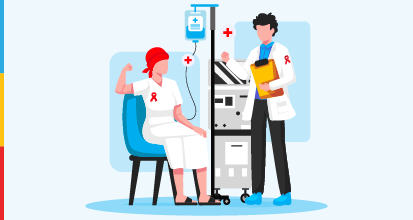Written by : Knowledge Centre Team
2025-11-20
1001 Views
8 minutes read
Share
A critical illness can have a significant financial impact on a family. The cost of medical care can be high, and you may have to miss work while you recover. This can lead to a loss of income and an increase in expenses. The family may also incur debt to pay for medical care. A lump sum pay out from a critical illness insurance plan helps you avoid financial distress due to prolonged medical conditions.
Critical illness insurance is a type of insurance that helps to cover the costs associated with a listed critical illness. The benefit amount and payment from the critical illness insurance plans do not depend on your actual expenses.
Critical illness insurance works by providing you with a lump sum of cash if you are diagnosed with a covered illness. You don’t have to stop working to claim, but this cash can be used for
The illnesses covered and the definition of a critical illness can vary between insurers. However, IRDAI, the insurance regulatory authority, defines 20 health conditions as critical illnesses. Canara HSBC Life Insurance iSelect Smart360 Term Plan covers 40 different health conditions.
The cost of critical illness insurance varies depending on your age, lifestyle and health. For example:
This will depend on the insurer, but in most cases, critical illness cover pays out once you have been diagnosed with the condition, or if it is determined that the condition is chronic and irreversible. Typically the claims can be processed within 30 days after you submit all the necessary documents.
Critical illness insurance is popular for several reasons. It provides peace of mind knowing that you and your family will be taken care of financially if you experience a serious illness. The plan is designed to give you the financial security to take time off from work to focus on your recovery. Some other reasons for its popularity are listed below:
The best way to choose a critical illness insurance plan is to first assess your needs and then compare different life insurance policies to find the one that best suits your needs. You should also make sure to read the fine print carefully to understand the coverage and exclusions. There are a few factors which you must keep in mind while choosing a critical illness plan:
Like other insurance policies, critical illness policies also have certain clauses that you must be cognizant of when signing up. An incident of a stroke may not be sufficient reason for an insurer to disburse a payment unless, say, the neurological damage prolongs for more than 30 days.
The chances of being diagnosed with a critical illness are relatively low. However, the chances increase as you get older. Make sure that the plan you choose covers the type of care that you need.
An OTP has been sent to your mobile number

Sorry ! No records Found
Thank You for submitting the response, will get back with you.
Disclaimer - This article is issued in the general public interest and meant for general information purposes only. The views expressed in this blog are solely those of the writer and do not necessarily reflect the official policy or position of Canara HSBC Life Insurance Company Limited or any affiliated entity. We make no representations or warranties of any kind, express or implied, about the completeness, accuracy, reliability, suitability, or availability with respect to the blog or the information, products, services, or related graphics contained in the blog for any purpose. Any reliance you place on such information is therefore strictly at your own risk. You should consult with a qualified professional regarding your specific circumstances before taking any action based on the content provided herein.









Canara HSBC Life Insurance offers online term insurance plans to secure your family financially in your absence.